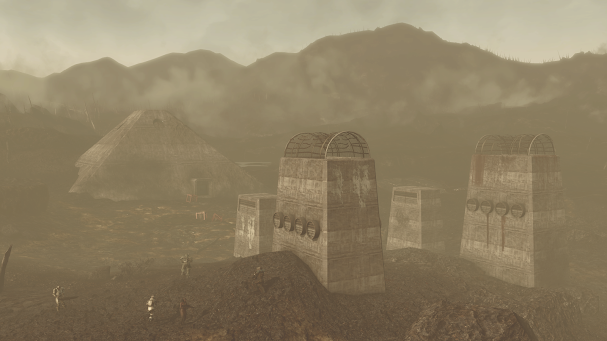Shopping Cart Theory in War Movies and Life: An Important Fundamental Test of Good Humanity
Introduction
The shopping cart theory is a viral Internet trend from 2020 that started with a social media post. It describes the act of returning a free shopping cart at a store as defining one's moral character. The author of the post says:
I agree with this sentiment, except at the end, the author gets very direct and finishes off with some more radical statements accusing those who don't return shopping carts like they are ready to invade Poland. While it has received a lot of praise, the shopping cart theory has been accused of being too extreme. I think the author worded their theory too radically, and it really should be taken lightly.
Some people have mentioned being disabled or having chronic pain which would prevent them from returning a cart to a cart return, which they may not have the luxury of parking next to if the parking lot is very full. The words that the author used conveys a harsh sentiment for those who don't strictly follow it, akin to the ideology of social Darwinism that has been criticized for encouraging too much of an individualistic society. The shopping cart theory should be taken lightly, because while you gain nothing by returning a cart, you also gain nothing by looking down on someone not returning a cart, even if they are in the wrong. Regardless, it is extremely important for one to own up to their mistakes and at least recognize that if they were perfectly capable, that they would choose to put the shopping cart back.
Some have also mentioned not returning a shopping cart to make the retail workers do more work, but... what? While I am no expert, retail workers are commonly paid by the hour, not the number of carts they return, so this action would be hurting them directly when retail workers are typically not a group of concern. This is like leaving all your mess in your mother's kitchen because, well, she needs to work more, because obviously she hasn't had enough work wiping your ass or someone else's ass for a chunk of her life and spending money to upkeep such an expensive financial liability that you are. Not returning the shopping cart when you are fully capable of doing so is inadvertently disrespectful to the retail workers and disrespectful to other drivers whose car may get scratched by a runaway cart.
There is another important piece of the puzzle that makes the shopping cart theory a very big deal. Under a certain condition, the shopping cart theory becomes the ultimate test of morality and humanity. A truly good person, whether they were always good or they turn good, will always put the shopping cart back under the condition if they are confronted by death or a dire circumstance (may be figurative).
A Fundamental Test of Good Humanity
When confronted with death or a dire circumstance, a truly good person will always choose to put the shopping cart back because it is the correct, appropriate thing to do. The theory becomes an ultimate fundamental test of good humanity. When confronted by death, a good person will always try to make the most of what they have and make the next right decision. This is extremely important because under such dire circumstances, it is much easier to make a decision benefitting oneself rather than others. If they still choose to not put the shopping cart back under dire circumstances, then they are not truly good and that defines their character.
I realize this is the reason why I like war movies. It's not always about the war or the politics, it's about the basic fundamental human connections with nature. Also, war movies are often anti-war. Warfare reveals fundamental connections between humans and nature that goes all the way back to hunter gatherer societies. A hunter is constantly confronted by death and must hunt to help support the family. Similarly, a soldier is constantly confronted with death and situations that the human brain cannot easily tolerate but they must support their side. A soldier in a war movie has no control over the enemy, where they are, or if they will survive, so their behavior becomes the ultimate test of the shopping cart ideology: do you have the heart to protect the ones that you have the means to protect... your fellow comrades... and choose the next most right decision? If one still chooses to put the shopping cart back while undergoing such dire unimaginable circumstances during total war, then that is truly something special, while the stories you hear about rape, murder, unnecessary violence, and Geneva Convention violations would be results of not putting the shopping cart back in the face of those same circumstances. Total war separates those who can still retain their morals and those who cannot. In hunter gatherer societies, you must do your part for the survival of your family or face death, and making decisions to only benefit yourself may leave you all alone to die.
The greatest people will always choose to put the shopping cart back in the face of death. They demonstrate that they can take charge and they can make informed decisions under pressure. They will always choose to protect those they are capable of protecting while not conducting unnecessary atrocities. This gives real meaning to the quote, "the real heroes are dead," where some of the most admirable soldiers were killed for making a decision that made them most vulnerable to enemy fire in an effort to protect their brothers and complete an objective. They had nothing to gain from taking the initiative, there were many other soldiers, but it was the most right decision when they could not control anything else around them. They took the initiative and demonstrated that they had brave leadership skills. Of course, hopefully, no one else has to die like this, as capable leaders can also survive and lead their armies in a successful and honorable manner. In this light, the real message that war movies convey is that during such brutal situations when you cannot control anything around you, who really has the biggest heart to make the next right decision for the sake of what's left of humanity? Who has the biggest heart to make an effort to put the shopping cart back even when no one is looking? And can they continue to do that while trying to mitigate any unnecessary suffering?


Comments
Post a Comment